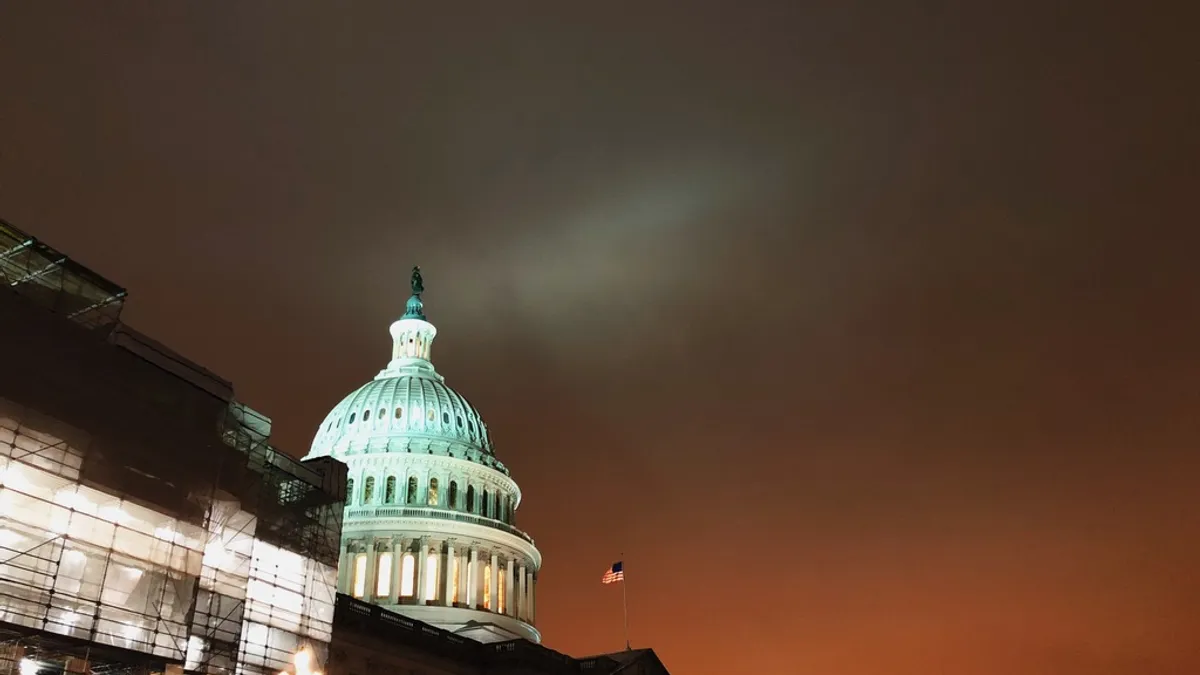Dive Brief:
- A collection of transportation and labor groups have joined businesses and the U.S. Chamber of Commerce in a joint letter to U.S. House of Representatives and Senate leaders calling for a national vehicle miles traveled (VMT) program to pay for infrastructure fixes.
- In a letter to House Transportation and Infrastructure Committee Chair Peter DeFazio and Ranking Member Sam Graves, and U.S. Senate Committee on Environment and Public Works Chair Tom Carper and Ranking Member Shelley Moore Capito, the groups warned that the reliance on the federal gas tax to keep the Highway Trust Fund (HTF) solvent is unsustainable, as tax receipts do not keep pace with new fuel efficiency and vehicle electrification.
- Instead, the signees call for a national VMT program that would replace all current gas taxes and fees, building on a federal grant program that has looked to foster similar schemes at the state level. A national system — which they said should have provisions around data collection, equity, interoperability and costs — could be tested first by federal and state fleets, including by the U.S. Postal Service.
Dive Insight:
The letter's signees, which include the American Public Transportation Association, the American Association of State Highway and Transportation Officials, the Governors Highway Safety Association and the Intelligent Transportation Society of America, say the current system of using regular transfers from the General Fund to keep the HTF solvent is not a long-term solution. They note that Congress has authorized transfers totaling $158 billion since 2008.
"Congress must consider a long-term solution to ensure HTF viability and the future health of our surface transportation system, and to maintain the user fee principle upon which the HTF is founded," the letter reads. "A VMT or mileage-based user fee to replace all current motor fuel taxes and fees is that solution."
Signees pointed to the Surface Transportation System Funding Alternatives (STSFA) Program, which was established under the Fixing America's Surface Transportation (FAST) Act and has provided grants to states to demonstrate alternative funding methods. STSFA has provided $73.7 million to 37 projects in states across the nation since its introduction, funding projects that test the design, implementation and acceptance of systems based around usage, like a VMT fee. The grants also pay for public outreach and education.
In written testimony before the U.S. Senate Committee on Environment and Public Works on the HTF's future, Douglas Shinkle, transportation program director at the National Conference of State Legislatures, said at least 19 states considered legislation on road-user charges like VMT. At least seven of those states — Maine, Nevada, New Mexico, Oregon, Utah, Virginia and Washington — enacted legislation.
"These pilots provide valuable lessons learned and identify several important factors to consider for implementing a national VMT program," the letter reads. "It is now time for Congress to leverage the progress made to-date and create a comprehensive national VMT implementation program."
The federal gas tax has not been raised since 1993, and its long-term future has been in question for some time, especially amid the coronavirus pandemic and with a debate raging over how to pay for infrastructure investment. New Transportation Secretary Pete Buttigieg has refused to commit full support to a VMT fee, and there are indications that some Republicans are willing to use it as a political cudgel in upcoming elections, especially as they say it would impact rural drivers the most.
But other Republicans seem more willing. In a statement, Graves said elected officials "should not further delay [the letter's] call to move towards a national program. If we do not take concrete steps towards setting up a national program, then we will always be 10 years away."
"Funding our infrastructure should not be a political battle," Graves said. "It's time to set a definitive path towards the long-term sustainability of the Highway Trust Fund — a path that is totally funded by all users of the system and not by insufficient gas taxes and deficit spending. This is how we realize the transformative projects everyone wants to accomplish."
But others are not so sure. During the Senate hearing, Capito said elected officials "ought to really consider" user fees, especially as they have bipartisan support. But in her opening statement, she warned that potential impacts must be mitigated.
"All who use our surface transportation system should contribute to its upkeep and expansion," Capito said. "And today, that is not the case with all of the users. We should consider the unique impacts on certain Americans, including those in rural areas and lower income individuals. We should try to minimize administrative and cost burdens. We also should try to provide states and other non-federal partners with options to use various financing tools."












